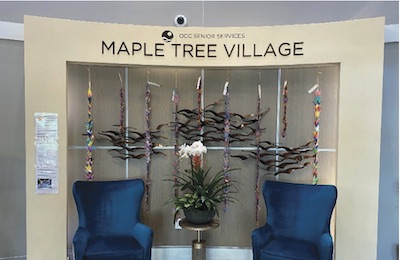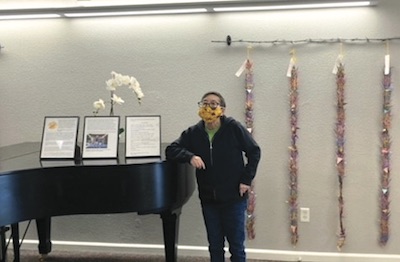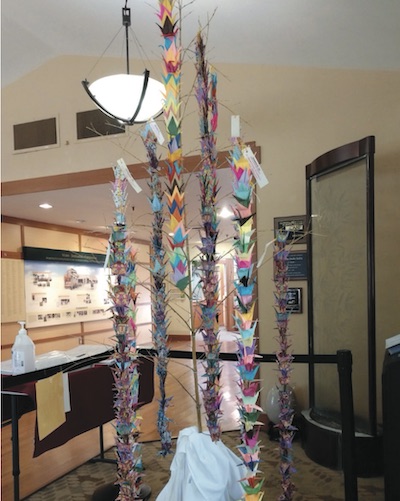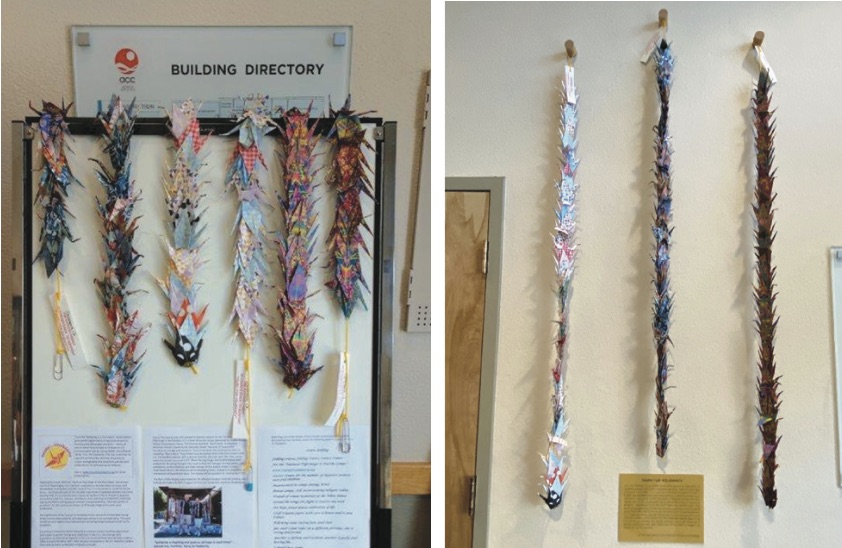ACC Remembers the Past and Sends a Message of Peace for the Future
If you have visited one of the ACC Senior Services facilities since April, you may have noticed a display of tsuru (origami cranes) to greet you as you entered. You may have asked, “This is beautiful. But why are they here?” Here’s the story…

It started two years ago, with the creation of Tsuru for Solidarity (T4S), a nonviolent, direct action grassroots organization of Japanese American social justice advocates and allies – many of whom were incarcerated as children in U.S. concentration camps during WWII. Since March 2019, T4S has mobilized to support communities directly impacted by unjust immigration and detention policies and other forms of state and racial violence. #CloseTheCamps #NeverForget
Planning had been underway in earnest for a June 2020 T4S “National Pilgrimage to End the Camps” and protest march on Washington, D.C., where survivors and descendants would place 125,000 cranes (“tsuru” in Japanese) on the White House fence – one tsuru for each of the 125,000 incarcerees of Japanese ancestry who were unjustly held in U.S. concentration camps during World War II. People of Japanese descent from the U.S., Canada, and Mexico were planning to protest the continued caging of children and separation of their immigrant families. Then the COVID-19 pandemic hit, the country shut down, and the national pilgrimage and protest were postponed.

Instead of the D.C. protest, Tsuru for Solidarity hosted “Tsuru Rising!”, a virtual protest to close the camps, and Kimochi Night, a space for cultural celebration and healing. For three days, T4S brought together 1,000 attendees, 30,000 online viewers, nearly 250,000 tsuru (from churches, Girl Scouts, Buddhist temples, families, Nisei seniors, an origami class at San Quentin, activist groups, university clubs, other countries, and many more), seven direct actions, 22 healing circles for change, and dozens of artists, organizations, and activists – all of whom gathered as a collective community toward transformative solidarity.
The significance of the tsuru is to remember those who were incarcerated during WWII, and to show solidarity with detainees who are incarcerated today. The cruel conditions and neglect they have endured are being dangerously worsened by the pandemic.
With over a quarter of a million tsuru in storage, T4S has been spreading tsuru across the country, continuing protests to close the migrant detention camps. In addition, tsuru are being spread in communities as a sign of peace and love.

According to Detention Watch Network (a national coalition-building organization with a goal to abolish immigration detention in the U.S.), the average daily population of detained immigrants in the U.S. increased from approximately 5,000 in 1994 to nearly 40,000 in 2017. After 30 years of expansion, the U.S. detention system now holds as many as 400,000 immigrants annually.
As a result, Tsuru for Solidarity, set a NEW goal of 525,000 tsuru – to honor those Japanese Americans incarcerated during WWII and to include the number of immigrants incarcerated annually. Through folding tsuru, T4S will show that immigrant children, youth, families and other detainees seeking safety in the U.S. will not be forgotten.
One local group wanted to express support for the T4S National Pilgrimage in Washington, D.C. – a book discussion group sponsored by the Robbie Waters Pocket-Greenhaven Library. The librarian selected, “Kiyo’s Story: A Japanese-American Family’s Quest for the American Dream” because of its powerful narrative of courage and resilience. Those in the book discussion group were so moved by “Kiyo’s Story,” they folded tsuru to express their collective concerns with U.S. immigration policies, with a plan to have the tsuru join with the other cranes when the protest occurred in D.C. When the pilgrimage and protest march were postponed, the group thought they could extend the message of hope, peace, and celebration, to local libraries and other venues. At the Robbie Waters Pocket-Greenhaven library, you’ll find books related to the Japanese American incarceration and immigration along with the tsuru. The tsuru are on display in the foyer entrance into the library.

In an effort to spread the message of peace, joy, and hope, ACC Senior Services has also created displays of tsuru in every facility lobby for staff, volunteers, and residents and their family members, to brighten their days and to share information about Tsuru for Solidarity. ACC Senior Services has been a proud T4S supporter and created beautiful displays in all venues for staff, residents and their families and friends, and visitors.
All of the tsuru on display at ACC Senior Services were folded by Jim and Jean Kawano of Sacramento, who individually folded 20,000 in support of Tsuru for Solidarity and its mission.
Betty Eng, one of the members of the library book discussion group, is a life-long Sacramento area resident and community activist. She has been a long-time comrade and friend of Satsuki Ina, co-chair of Tsuru for Solidarity. Betty participated in original discussions of the formation of the Asian Community Center in the 1970s. According to Betty, “I am pleased that ACC has taken on sustaining and long-term policies regarding the pandemic, attacks on Asian American community and issues of the elderly. The services provided by ACC such as independent and assisted living facilities, on-line classes and workshops, transportation and Meals on Wheels have also been an amazing contribution to the community.”
Crane Folding
A Poem by Betty Eng, Community Activist, Ed. D.
May 12, 2020
Folding cranes, folding cranes, cranes, cranes
For the “National Pilgrimage to End the Camps”
www.tsuruforsolidarity.org
125,000 cranes for the number of Japanese women, men and children
Incarcerated in camps during WWII
Brutal camps, still, incarcerating refugees today
Strands of cranes to protest at the White House
Spread the wings for flight to receive my wish
For hope, peace and a celebration of life
I fold origami paper with care to honor and to pay tribute
Following same instructions and steps
Yet, each crane takes on a different persona: one is strong and proud,
Another is defiant and resilient, another is goofy and having fun…
I should be a crane.

